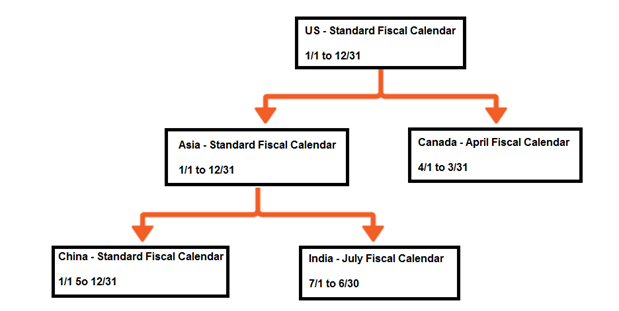 For organizations that has multiple subsidiaries and they need to have different accounting periods and tax periods, please consider enabling multiple calendar in Netsuite OneWorld. This feature is available only in NetSuite OneWorld and is not enabled by default.
For organizations that has multiple subsidiaries and they need to have different accounting periods and tax periods, please consider enabling multiple calendar in Netsuite OneWorld. This feature is available only in NetSuite OneWorld and is not enabled by default.
The Multiple Calendars feature determines the rollup structure for tax periods. Multiple calendar allows you to assign any new fiscal calendars to subsidiaries. Also, if you acquired a new company and need to set up a short fiscal year, this would help you to set up a short fiscal year and the future fiscal year. I’ll discuss the steps to set up the fiscal calendars and accounting period rollups.
To use fiscal calendars, the Multiple Calendars feature must be enabled. Fiscal calendars apply to accounting periods and tax periods. If you create different accounting period rollups for subsidiaries, the accounting period rollup is defined within the context of fiscal calendar. Each accounting period rollup groups transaction data from a common set of base periods into fiscal years.
A fiscal calendar determines the start date for a fiscal year and rolls up the accounting periods to build a fiscal year. The lowest level accounting periods that make up a fiscal year are shared across all fiscal calendars. Aggregate periods within a fiscal year, such as quarters and years, are unique to a fiscal calendar. Base period names are shared across all fiscal calendars, and base period names in a fiscal calendar must be unique.
You then assign a fiscal calendar to a subsidiary to determine how to roll up accounting periods for reporting activity in that subsidiary. A subsidiary can have only one fiscal calendar in effect at a time. You can change the fiscal calendar assigned to a subsidiary as needed.

The diagram above shows a subsidiary hierarchy with three fiscal calendars. The Standard Fiscal Calendar starts January 1 and is assigned to the U.S., Asia, and Japan subsidiaries. The accounting period rollup for these subsidiaries organizes fiscal years to start January 1 and end December 31. The April Fiscal Calendar is assigned to the Canada subsidiary to create fiscal years beginning April 1 and ending March 31. The India subsidiary fiscal year runs July 1 through June 30, so the July Fiscal Calendar is assigned to the India subsidiary.
NetSuite creates a default Standard Fiscal Calendar when you enable the Multiple Calendars feature. Your existing fiscal year structure determines the start date and period rollup structure for the Standard Fiscal Calendar. I you enable the Multiple Calendars feature before creating any accounting periods, the Standard Fiscal Calendar does not have a start date or accounting period rollup structure until you set up accounting periods.


The Standard Fiscal Calendar is assigned to all existing subsidiaries and to any new subsidiaries you create. It remains the default fiscal calendar until you designate a different calendar as the default. When you change the default fiscal calendar, only subsidiaries created after that point are assigned the new default fiscal calendar. Existing subsidiaries continue to use the Standard Fiscal Calendar. The fiscal calendar for subsidiaries previously assigned does not change. Rename the Standard Fiscal Calendar when it is no longer the default fiscal calendar.
An accounting period rollup provides the structure to organize the base accounting periods for reporting. The base accounting period is typically a month. Month periods can be calendar months, 4 week months, or months of 4-4-5 weeks. The Set Up Full Year function creates fiscal years based on calendar months. If you want to use periods other than months, you must use manually set up accounting periods and fiscal years using New Year Only, New Quarter Only, and Base Period buttons. Best practice is to use Set Up Full Year to generate your accounting periods.
On the Manage Accounting Period page, select a fiscal calendar to display accounting periods using the period rollup for that calendar. The fiscal calendar determines the rollup hierarchy for the accounting periods. You must set up a fiscal year in order for the Manage Accounting Periods page to display a fiscal period rollup.
Existing base accounting periods that are not included in the accounting period rollups for a fiscal calendar display on the Manage Accounting Periods page under Unassigned. For complete consolidated reporting, you must define a complete rollup hierarchy for a base period by assigning its sub-period of relationship for each fiscal calendar
To add unassigned periods to accounting rollups:
- On the Manage Accounting Periods page, select a fiscal calendar and check for unassigned periods.
- Click an unassigned period to edit.
- On the Edit Accounting Period page, assign the period to a sub-period for each fiscal calendar that exists.
- Click Save.
It is important for you to review each of these steps to determine which settings best align with your business requirements before enabling the multiple calendar. Some of these settings can have significant impact, so I highly recommend reviewing SuiteAnswers and/or the field help for each preference to understand the available options. NetSuite makes it easy to configure multiple calendar, fiscal calendar and accounting periods. Do you have questions about setting up enabling the multiple calendar in NetSuite? Contact Concentrus today to discuss your needs with one of our NetSuite experts.
About Us
Concentrus is a complete NetSuite solutions provider that guides organizations through how to use NetSuite to reach highly focused business goals and objectives. We provide NetSuite implementation, developer, integration, and customization services to ensure that you have a long-term solution that is tailored to fit your systems, people, and processes.
Read About Our Implementation Methodology
Want more NetSuite Tips and Tricks? Check out our Short & 'Suite videos




